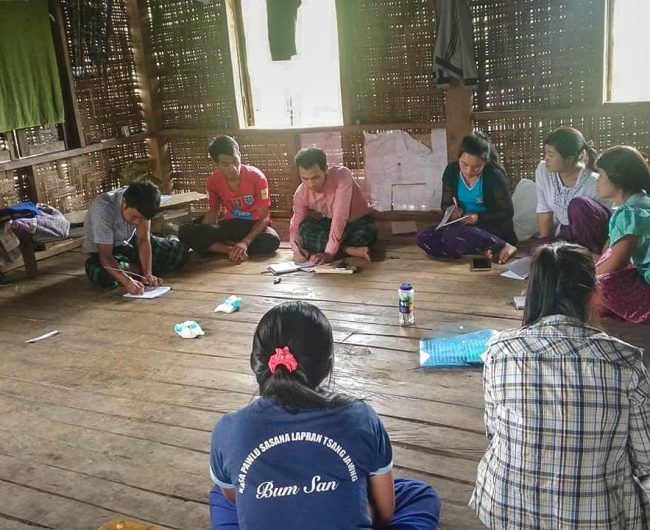Summary
In Myanmar’s rural north east, three villages (Bum San, Hting Nan and Nhtanzup) and several internally displaced persons (IDP) camps around the township of LaiZa must cope with the various effects of the conflicts and delicate political situation, one of which was the lack of educational opportunities for their children.
The ten schools serving these vulnerable communities were not able retain teachers due to lack of funds and the difficulties presented by the political instability and ongoing violence. The parents of the children are mostly hardworking but illiterate farmers, too poor to send their children away to school and so, without an education, leaving the children no choice but to work in the fields, vulnerable to exploitation.
We provide financial assistance and training for volunteer teachers so that the schools can remain open for the full school year. A vital part of the programme is the training provided for the teachers so they can better teach and understand the needs of their students. They help students learn the importance of health, inclusion, physical fitness and other skills to improve their lives and view of the world.
Background
The Myitkyina Diocese Development Department (MDDD) is deeply involved in supporting the needs of communities throughout northern Myanmar. They are a religious organisation that helps everyone in the communities they work in, without any requirement for religious adherence. The MDDD is run by Bishop John Zau Li, who is the chairman of the organisation. Assisting him directly is Reverend Paul Sin Wa Naw, who is the educational coordinator and manager.
This project operates in three villages, Bum San, Hting Nan and Nhtanzup; and several internally displaced persons (IDP) camps around the township of LaiZa.
Despite Myanmar’s ongoing transition to democracy and signing of the National Ceasefire Agreement (NCA), armed conflicts continue in remote parts of the country, where the majority of the inhabitants are members of ethnic groups. Violent outbreaks between local groups and government military still occur frequently, driving many to flee and take shelter in camps for Internally Displaced Persons (IDPs). Such insecurity renders countless lives vulnerable, particularly those in marginalised and rural areas. In Myanmar’s rural north east, two villages (Bum San and Hting Nan) and several internally displaced persons (IDP) camps around the township of Laiza must cope with the various effects of the conflicts and delicate political situation, one of which was the lack of educational opportunities for their children.
The ten schools serving these vulnerable communities were not able to retain teachers due to lack of funds and the difficulties presented by the political instability and ongoing violence. Without teachers, the schools could not operate, and the children had no alternatives to receive an education. Their parents are mostly hardworking but illiterate farmers, too poor to send their children away to school. This would leave them no choice but to work in the fields, leaving them vulnerable to exploitation. Many eventually become soldiers, and most remain illiterate with no chances of improving their situation. With no options, many then lead difficult lives and run the risk of being driven to crime, drugs and drinking.
PCF has partnered with the Myitkyina Diocese Development Department (MDDD) to give these children a chance to get an education. By providing financial assistance and training for volunteer teachers the schools can remain open for the full school year. Through our support for a nominal salary, food and transportation, the teachers can stay on, the schools can keep their doors open, and the at-risk children can get a much-needed education.
As well, a vital part of the programme is the training provided for the teachers so they can better teach and understand the needs of their students. They help students learn the importance of health, inclusion, physical fitness and other skills to improve their lives and view of the world.
Goals and Results
Goals
- Improved literacy in the two villages and IDP camps
- Greater educational opportunities in the two villages and IDP camps
- Education as prevention to poor social development and behaviour, like drugs and alcohol abuse, and taking part in conflict situations.
- Improved educational and social development for the children, so they can take greater responsibility for their own future and growth.
Results
- The first year of the project has been successfully conducted, with all activities being implemented according to the initial plan.
- Four capacity-building workshops and one evaluation meeting were conducted with 28 teachers, including the headmasters and school committee members.
- 20 teachers from the eight schools directly benefited from four capacity-building workshops on the topics of situation analysis, library management, the right to health and the role of schools, basic healthcare and first aid, mental health and children of special needs, labour rights and Thai law, sexual and gender-based violence prevention, child protection policy, participatory teaching methodology and English language teaching methods.
- Seven out of the eight schools received school material support and identified their needs for additional equipment, material and infrastructure support. One school did not require school equipment as they already had an existing sponsor.
- All the eight targeted schools received support for and established their own reading libraries and first aid corners.
Sponsors
Edwin Wierda | 2022-23 | €22.455
Christine Peter | 2021-22 | €4.272
Jars of Clay | 2021-22 | €5.000
Paul Overdijk | 2021-22 | €385
Rob Cubbon | 2021-22 | €1.403
Robin de Witt & Maaike Tamis | 2021-22 | €4.000
Willem Grosheide | 2021-22 | €1.075
Lucendi | 2020-21 | €13.917
Lucendi | 2019-20 | €6.083
Tony Mann | 2019-20 | €5.162
Jars of Clay | 2019-20 | €5.000
Friends of Arco Bakker | 2019-20 | €875
Arco Bakker | 2019-20 | €5.000
Jars of Clay | 2018-19 | €5.000
Tony Mann | 2018-19 | €11.084









